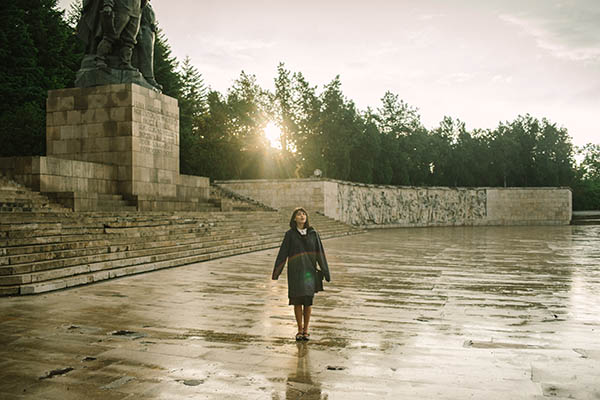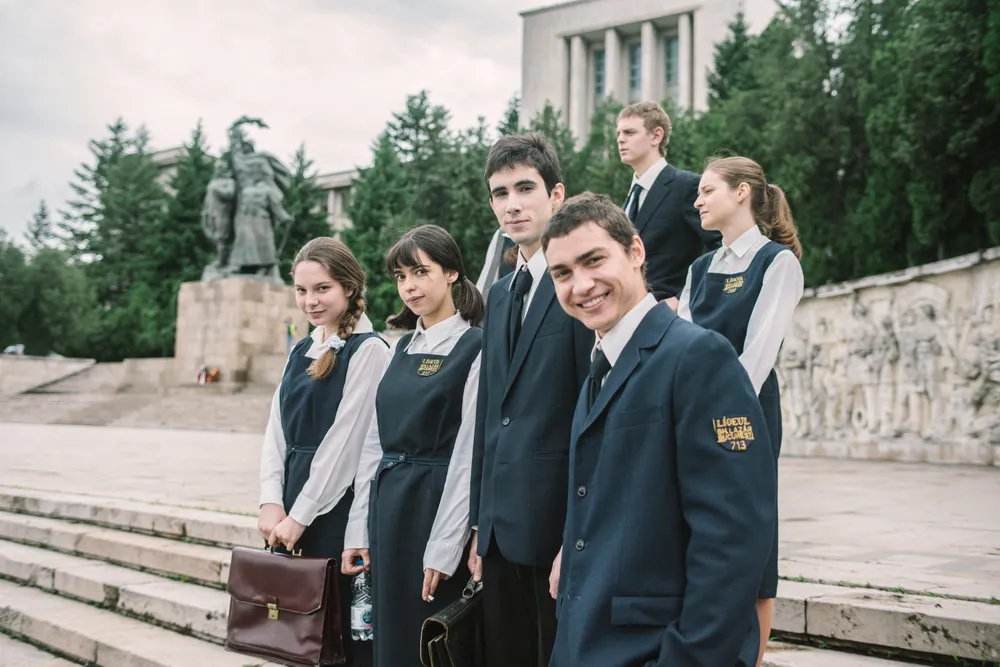Alexandru Belc’s Metronom helps the viewer relate to the past with a beautiful and impactful coming-of-age love story intertwined with a tale about freedom of speech.
Director/writer Alexandru Belc grew up in Romania and has spent plenty of years, more than twenty, implementing a social campaign to bring the older archives from Radio Free Europe from the Hoover Institute to Bucharest. This is because so many audio libraries from past decades, like the 70s and 80s, were stashed up there. That radio broadcasting organization was created by the United States government way back in the 50s to get information and political commentary out to the people living in communist eastern European territories and the Soviet Union. All his research inspired him to make a documentary on his findings and the impact these would make. Albeit that documentary didn’t get made; instead, he decided that the best format to tell this story was in a feature film format. Hence, the creation of his latest feature, Metronom (which screened at the Un Certain Regard selection at this year’s Cannes Film Festival), commenced.
The movie is named after the Radio Free Europe show of the same name. The legendary music presenter and rebel, Cornel Chiriac, had this show running for a couple of years; the show achieved cult status because of him. The young Romanian generation of the time stayed in their homes listening to the broadcast. Chiriac was a very influential figure for them. The regime feared him because his shows weren’t all about the music, even if they played tons of classics from the 60s and 70s. He talked about liberty, oppression, politics, and more topics that sparked controversy among the higher-ups in the country. Not many filmmakers have tried to explore Romania’s communist past and its secret police, the Securitate. Nonetheless, Alexandru Belc decided that it was time to share these stories with the world in a manner that people see the harsh reality of those times.
Metronom is a coming-of-age love story intertwined with a tale of the 70s generation’s freedom. It’s inspired not only by the director’s research but by the actual acts of resistance that several fellow citizens did to defy censorship. The idea of freedom is universal, and Belc mentioned that the core idea of Metronom is for the viewers to relate to the past and not make the same mistakes again. The movie is set in Bucharest in the early 70s, during the height of its communism. It centers around the young seventeen-year-old girl named Ana (Mara Bugarin, whose performance breaks your heart into pieces), who is at odds in her life. Her boyfriend, Sorin (Serban Lazarovici), and his family were granted a permit to move to Germany, causing their relationship to reach an untimely end. Her best friend Roxana (Mara Vicol) says she needs to put the sadness aside and join the party at her apartment.

She really wants to go, mainly for the music and because Sorin might be there. Her mother forbids her to go there, but Ana sneaks out. The film’s first forty-five minutes are primarily set at Roxana’s apartment party. Ana arrives early, so she hangs out with Roxana for a while before the others come. “I can’t live without you,” Roxana tells Ana, and it feels genuine. Their grounded performances and chemistry are palpable, feeling like they are actually best friends in real life. Once the festivities begin, the atmosphere transitions to a livelier one. The kids talk and joke around, drink some brandy, dance around in the apartment, and listen to the Metronom show on Radio Free Europe. During the party, the kids decide to write a letter to the show’s host, Cornel Chiriac, which includes the phrase “make love, not war” and a list of artists they would like to hear on the program (Jimi Hendrix, Chicago, Blood Sweat and Tears, etc).
Sorin volunteered to smuggle the letter out of the country, but that might cost them. So, the host of the show delivers a quick message: “Dear friends, today I’ll bring a tribute to the memory of Jim Morrison, the lead singer of The Doors, who passed away in Paris because of a heart attack.” And then it begins, a long shot, with direct music playing, of the kids dancing to the band’s classic song “Light My Fire” in memory of the legendary frontman’s death. This might be the best needle drop of that song that I have seen in a film. It’s a moment that fills the viewer with joy as you see them having so much fun dancing around to the classic lengthy instrumental. The members of the famed band, whom I love, have said that the lyrics to said track are up to interpretation. It could mean plenty of things when you put it into context with this feature.
The term “light my fire” could go in the route of the romance between Ana and Sorin (kindling the candle of their passion for each other) or in a more political manner (igniting the torch of freedom in a time where hope for what may come next is lost). It probably is neither, and the reasoning behind choosing this record is because it’s a fantastic song, but I honestly think it matches the themes being tackled, whether it was on purpose or not. Even the song’s lyrics on some of its verses fit both analyses. Nevertheless, Ana is having the time of her life, right until Sorin arrives. Their dynamic at first seems too restrained, which fits the aspect of star-crossed lovers – they won’t be together for long enough. However, as they keep talking to each other and looking into each other’s eyes, everything goes back to normal. Yet, when Ana says the words “I love you” assuredly, it causes Sorin to leave the party immediately.
He’s afraid of what may happen to her if this relationship continues, and she gets caught in his acts of rebellion. Ana stays behind, but the Securitate secret service crashes the party. The film changes its presence and structure – presenting a darker tone to match the political pasts of early 70s Romania. Like Charlotte Le Bon’s Falcon Lake, this movie presents itself in one manner, and then it shifts into another – deceiving the viewer of what happens in its latter half. It’s not to the same degree as the aforementioned feature, but I didn’t expect what was coming. It catches you off guard. Alexandru Belc deserves praise for his directorial efforts because he manages to get the audience loose and feel the vibrations of the party. However, everything comes crashing down once they arrive. The festivity high is long gone; what began as a coming-of-age drama, which in itself focuses on a love story between two souls who will be separated sooner rather than later, is now presenting thriller-esque features.

The tension rises by the minute as their freedom and innocence are tested. This transition between the genre’s flexibilities is astonishing, as it creates a feeling of disorientation and makes you feel like you are there with them. Every interaction at the party made you feel like you were at home, and once this quick switch is turned on, you’re all at sea – lost completely, worrying about the consequences of your next move. Will they send their friends to jail so they can have a better future? Will they keep their mouths tightly shut to protect them? These questions are all over Metronom’s second half. Belc crafts gentle yet roughened cinematic compositions as it sets the viewer in the era and creates an atmosphere of bliss during its first segments and oppression in the latter ones. As you rewatch it, knowing the film’s outcome, you notice a bit of foreshadowing at play, albeit lightly. The essence of defiance is present since Metronom’s initial moments – smoking, not listening to your parents, etc.
These small moments paint a picture that this narrative won’t have a happy ending. It doesn’t end in tragedy, like the Charlotte Le Bon picture mentioned earlier. However, after knowing some of the country’s history by doing some research, the finale hits a bit harder. There’s both hope and sadness intertwined with one another. These feelings are not presented on the outside but rather on the inside of all these teens. They wish for a better world (and they would fight for it), but most of their lives are tied there for good. This is a tale about freedom of speech but through the eyes of a girl who witnessed heartaches from different standpoints, in love and hope. It has the aesthetics of a stage play, tightly constructed, and packaged neatly in an easy-flowing 102-minute runtime. It’s terrifying that this type of activity, or somewhat similar ones, is still happening in other countries. And Metronom expresses it in a true-to-life and grounded manner so that we can feel a more profound impact once the credits roll.
Metronom is one of the films that premiered at the 2022 Cannes Film Festival on May 24, 2022, and won the Directing Prize of “Un Certain Regard”. Take a look at our other reviews and film festival articles and find more must watch movies.

